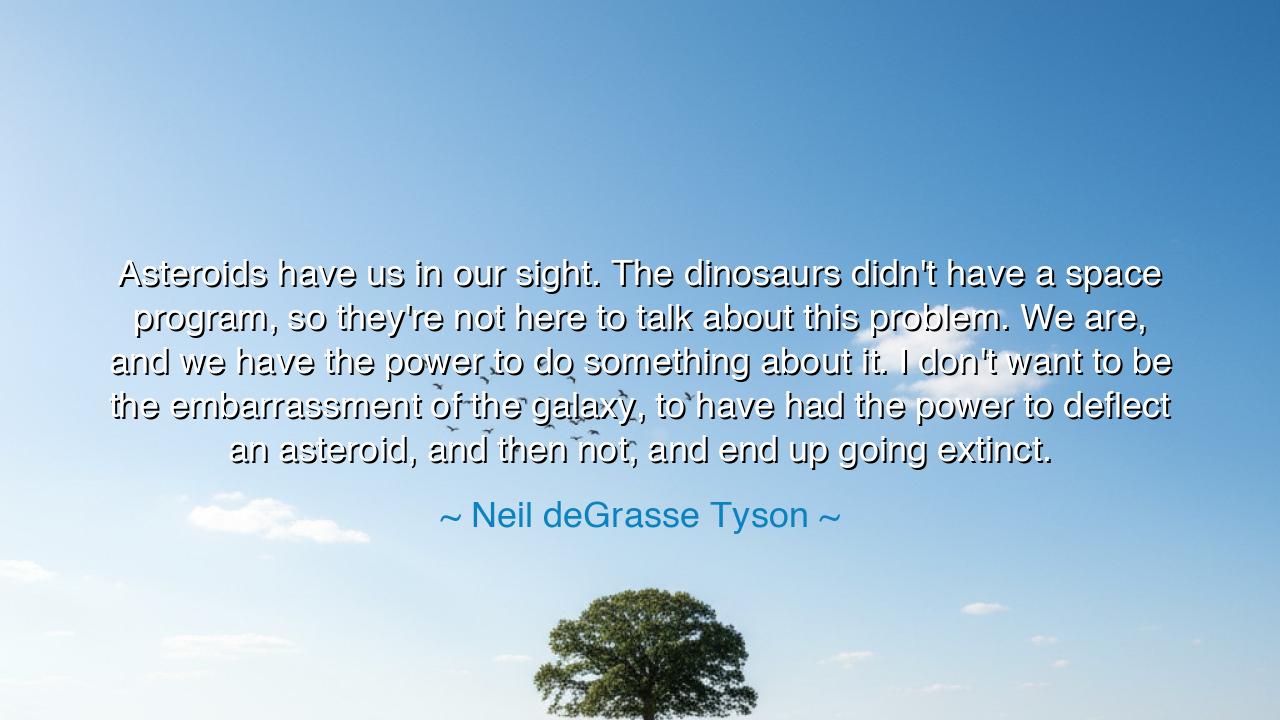
Asteroids have us in our sight. The dinosaurs didn't have a space
Asteroids have us in our sight. The dinosaurs didn't have a space program, so they're not here to talk about this problem. We are, and we have the power to do something about it. I don't want to be the embarrassment of the galaxy, to have had the power to deflect an asteroid, and then not, and end up going extinct.






“Asteroids have us in our sight. The dinosaurs didn't have a space program, so they're not here to talk about this problem. We are, and we have the power to do something about it. I don't want to be the embarrassment of the galaxy, to have had the power to deflect an asteroid, and then not, and end up going extinct.” Thus speaks Neil deGrasse Tyson, the herald of the stars, a man who reminds humanity not only of its smallness beneath the cosmos, but also of its responsibility. In these words, he strikes a chord of urgency and humility. For nature does not grant reprieve; the heavens are indifferent, and the rocks that drift through the void know nothing of pity. Yet unlike the beasts of old, mankind has been given foresight and the tools of science. To ignore this power is not only foolish, but shameful.
The origin of this statement lies in a truth written in the scars of the Earth. Sixty-five million years ago, an asteroid struck the Yucatán, unleashing fire, darkness, and death upon the world. The mighty dinosaurs, who ruled the land for millions of years, fell in silence, not for lack of strength, but for lack of preparation. They had no space program, no telescopes to foresee, no engines to deflect. Their dominion ended in an instant, for they were powerless before the heavens. Tyson recalls their fate not to mock, but to remind us: we, unlike them, can see what approaches. We can act. And thus the weight of responsibility falls upon us.
History offers parallels beyond the cosmos. When the plague swept Europe in the 14th century, men had no knowledge of microbes, no tools of prevention, no medicines to shield them. They perished by the millions. But centuries later, when epidemics arose, science provided vaccines, sanitation, and cures, and humanity prevailed. The difference was not in the wrath of nature, but in the preparedness of man. So it is with asteroids: to ignore the threat is to be as helpless as the dinosaurs; to face it is to wield the power of foresight that evolution has bestowed upon us.
Tyson’s words also strike a deeper chord of honor and shame. “Embarrassment of the galaxy,” he says, as though the stars themselves would look down upon us and judge. For what greater shame could there be than for a species to master flight, split the atom, walk on the Moon, and yet perish from an asteroid it could have deflected? Such a fate would not be tragedy alone; it would be folly, a cosmic humiliation. To possess the power of salvation, and yet not use it, is a betrayal not only of ourselves, but of the generations to come.
The ancients too spoke of vigilance. The Stoics warned that fate is indifferent, yet the wise man prepares. In the East, sages taught that to see danger and ignore it is not ignorance, but arrogance. Tyson’s call belongs to this eternal wisdom: knowledge without action is emptiness, and foresight without preparation is vanity. We must not be lulled by the slowness of time; even if the chance of an asteroid strike is small, the cost of neglect is the very extinction of our kind.
Yet beyond fear, Tyson’s words also carry a spark of greatness. To protect our world from asteroids is not merely survival—it is an act of stewardship, a declaration that humanity has come of age. For the first time in Earth’s history, a species has risen that can guard the planet itself. To act is to claim our place as custodians of life, protectors not only of mankind, but of forests, oceans, and every creature that breathes beneath the sky. This is not arrogance, but duty: to wield our strength not for destruction, but for preservation.
So, O listener, take this lesson into your heart: do not scorn the warnings of the heavens, nor rest in the comfort of denial. Honor the gift of foresight, and support the works of vigilance—science, exploration, preparation. Whether by funding research, defending reason, or inspiring the young to look to the stars, you too play a part in guarding our fragile world. For Tyson has spoken a truth as old as destiny: the dinosaurs are gone because they could not act. We remain because we can. The question is whether we will.






AAdministratorAdministrator
Welcome, honored guests. Please leave a comment, we will respond soon